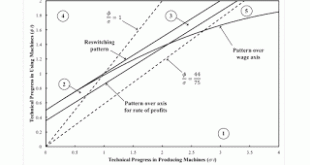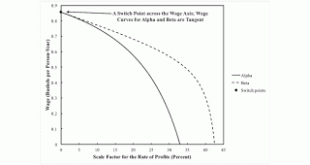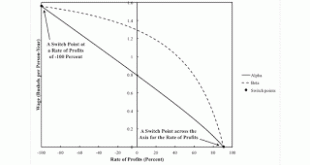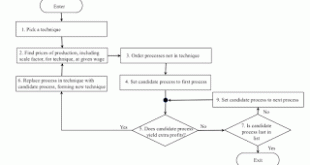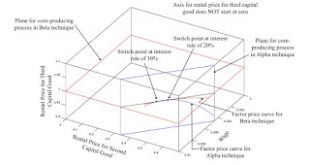Figure 1: A Partition of a Parameter Space for the Schefold Example1.0 Introduction I want to revisit a perturbation analysis of an example, from Bertram Schefold, of reswitching with fixed capital. Suppose workers use a machine to produce something or other, where the machine lasts several production periods. It is a possible choice to run the machine for less than its full physical life. One might think than choosing to adopt a technique with a longer economic life of the machine...
Read More »Financial Economics
This is a list of some of what I think one should know if one wants to talk to investors interested in theory. This post is not about making money and is probably not up-to-date. My references are fairly popular, and mostly old. I include one recent popular book as an example. Most of the references I do not recall very well, and I have not read Ben Graham. But many seem to know that Warren Buffet recommends this book. This post is non-critical. Keen and Quiggin in Debunking Economics and...
Read More »Elsewhere
A podcast interview with Philip Mirowski about how, roughly, neoliberals are exploiting the Corona Virus crisis in America. A book, Nine Lives of Neoliberalism, edited by Dieter Plehwe, Quinn Slobodian, and Philip Mirowski. Somewhere this is or was freely downloadable in PDF. A podcast interview with Marshall Steinbaum about the Chicago school of economics. A podcast episode, by two economics professor, trying to present an overview of Joan Robinson. A downloadable book, Labour and Value:...
Read More »A Refutation Of Austrian Capital Theory And Austrian Business Cycle Theory
1.0 Introduction I have not posted about a non-fluke switch point in a while. This is an example from Bertram Schefold. I have examined perturbations and variations of this example before. Here I present an example with tables exhibiting arithmetic. Is this any more transparent than examples presented with graphs? I have been listening to some lectures on YouTube, especially Richard Wolff. I now have another hypothesis why mainstream economists have been promoting lies, ignorance, and...
Read More »Old Findings For New Times
From John Kenneth Galbraith's The Affluent Society (1958), I know that widespread attitude to waged work among some in the United States is outdated. The conventional wisdom is that work is necessary because it is needed to produce the goods that sustain society. That was largely true before productivity increased so much, for example, in the post war golden age. Some jobs are still essential, by any narrow definition, but much wage work goes to creating goods and services that in any...
Read More »A Fluke Switch Point On The Wage Frontier
Figure 1: A Switch Point On The Wage Frontier with Wage Curves Tangent This post extends the example in my article in Structural Change and Economic Dynamics, suitably emended. Figure 2 shows an enlargement of part of the parameter space. The parameters of the point where the boundaries of Regions 1, 2, and 3 intersect are shown. In Region 1, the Beta technique is uniquely cost-minimizing for all feasible wages; there are no switch points. Region 2 is a reswitching example, with Beta...
Read More »A Fluke Case With Two Fluke Switch Points
Figure 1: Switch Points On The Axis For The Rate Of Profits And At r = -100 Percent This is an example of a fluke case in the analysis of the choice of technique. The interest in flukes, for me, is that they show how the characteristics of markets can change. They provide insight into structural economic dynamics, as Luigi Pasinetti calls it. I have previously shown a fluke case, with a switch point on the axis for the rate of profits with a real Wicksell effect of zero. A perturbation...
Read More »A Market Algorithm
Figure 1: Specification of a Market Algorithm1.0 Introduction This article is heavily based on Bidard (2004). An approach to the analysis of the choice of technique, in keeping with construction of the outer envelope of wage curves, is to consider replacing processes, more or less, one at a time. This post presents this approach as following an algorithm. Assume that a set of techniques exist where all techniques are at least viable, indecomposable, and produce the same set of...
Read More »Another Example Of The Factor Price Frontier In The Space Of Rental Prices
Figure 1: Real Factor Price Frontier1.0 Introduction I am planning on posting at an even slower rate for a while. This post continues my exploration of a way of visualizing the choice of technique proposed by Carlo Milana. In this post, I show how to correctly apply his visualization to an example from my 2017 ROPE paper. 2.0 Technology Two techniques are available for producing corn, the consumption good. Each technique consists of a flow-input, point-output technology, with a finite...
Read More »On “Democratic Socialism”
1.0 Introduction This post is about some usages of the phrase "democratic socialism". 2.0 Democratic Socialists of America (DSA) In the context of current American politics, I think the most salient usage today of this phrase is associated with Bernie Sanders' campaign and with the Democratic Socialists of America. DSA was founded in 1982 when the Democratic Socialist Organizing Committee (DSOC) merged with the New American Movement (NAM). The DSOC was established with Michael...
Read More » Robert Vienneau: Thoughts Economics
Robert Vienneau: Thoughts Economics

